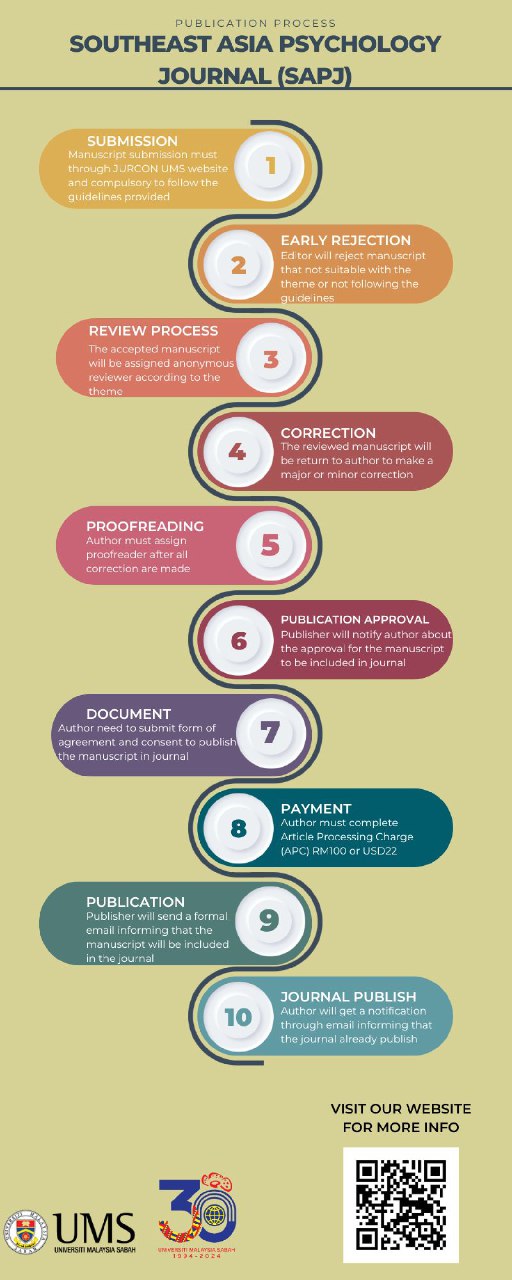THE RELIABILITY AND VALIDITY OF MULTIDIMENSIONAL SCALE OF PERCEIVED SOCIAL SUPPORT (MSPSS) AMONG UNIVERSITY STUDENTS IN MALAYSIA
DOI:
https://doi.org/10.51200/sapj.v12i2.5316Keywords:
Social Support, Suicide, Multidimensional ScaleAbstract
Social support is crucial to help students cope and analyse their mental health and overall well-being. Students' mental health may be impacted by stress from their personal lives as well as their studies, which may lead to suicidal thoughts and suicide attempts. This study evaluates the Multidimensional Scale of Perceived Social Support (MSPSS) by Zimet et al. (1988) among Malaysian university students regarding internal consistency, item-total correlation method, and convergent, concurrent validity. The sample comprised 268 university students from public and private universities around Malaysia. The Multidimensional Scale of Perceived Social Support (MSPSS) by Zimet et al. (1988) is an instrument to determine the degree of perceived social support from three sources: significant others, family, and friends. Cronbach's alpha of the three dimensions of MSPSS ranges from 0.898 to 0.916, which indicates a high reliability for the instrument. Item analysis using the item-total correlation method also shows that the items for the three distinct MSPSS dimensions are related and measure the same construct. Convergent validity also shows a significant correlation between the three dimensions, as evidenced by their correlation coefficient, which ranged from 0.477 to 0.528 with p < .001. On the other hand, concurrent validity scores demonstrate that the YSAS and ATTS scores have a negative and significant relationship with all three of the MSPSS dimensions. MSPSS is a reliable instrument that is suitable for assessing the perceived social support for university students in Malaysia. However, the concurrent validity of this instrument required further research.
References
Abma, I. L., Rovers, M. M., & Van Der Wees, P. J. (2016). Appraising convergent validity of patient-reported outcome measures in systematic reviews: constructing hypotheses and interpreting outcomes. BMC Research Notes, 9(1). https://doi.org/10.1186/s13104-016-2034-2
Aizpurua, E., Caravaca-Sánchez, F., & Taliaferro, L. (2021). Suicidality Among College Students in Spain: Prevalence and Associations with Substance Use, Social Support, and Resilience. Death Studies, 46, 2025 - 2030. https://doi.org/10.1080/07481187.2021.1888823.
Alsubaie, M., Stain, H., Webster, L., & Wadman, R. (2019). The role of sources of social support on depression and quality of life for university students. International Journal of Adolescence and Youth, 24, 484 - 496. https://doi.org/10.1080/02673843.2019.1568887.
Boersma, P. & Vahratian, A. (2021). Perceived social and emotional support among adults: United States, July–December 2020. NCHS Data Brief, no 420. Hyattsville, MD: National Center for Health Statistics. 2021. DOI: https://dx.doi.org/10.15620/cdc:110092external icon
Cherry, K. (2023, March 3). How Social Support Contributes to Psychological Health. Verywell Mind. https://www.verywellmind.com/social-support-for-psychological-health-4119970
Chu, H., Yang, Y., Zhou, J., Wang, W., Qiu, X., Yang, X., Qiao, Z., Song, X., & Zhao, E. (2021). Social Support and Suicide Risk Among Chinese University Students: A Mental Health Perspective. Frontiers in Public Health, 9. https://doi.org/10.3389/fpubh.2021.566993.
Coppersmith, D. D. L., Kleiman, E. M., Glenn, C. R., Millner, A. J., & Nock, M. K. (2019). The dynamics of social support among suicide attempters: A smartphone-based daily diary study. Behaviour Research and Therapy, 120, 103348. https://doi.org/10.1016/j.brat.2018.11.016
Cronbach, L. J. (1951). Coefficient alpha and the internal structure of tests. Psychometrika, 16(3), 297–334. https://doi.org/10.1007/bf02310555
Duncan, J. M., Lucier-Greer, M., Ferraro, A. J., & Reed-Fitzke, K. (2019). The Role of Social Support in Predicting Depression and Task Overload Among College Students. Journal of Human Sciences and Extension, 7(1), 12. https://doi.org/10.54718/BBLS9127
Holliman, A., Waldeck, D., Jay, B., Murphy, S., Atkinson, E., Collie, R., & Martin, A. (2021). Adaptability and Social Support: Examining Links with Psychological Wellbeing Among UK Students and Non-students. Frontiers in Psychology, 12. https://doi.org/10.3389/fpsyg.2021.636520.
Hu, L. T., & Bentler, P. M. (1999). Cutoff criteria for fit indexes in covariance structure analysis: Conventional criteria versus new alternatives. Structural Equation Modeling, 6(1), 1-55.
Ibrahim, N., Che Din, N., Ahmad, M., Amit, N., Ghazali, S. E., Wahab, S., Abdul Kadir, N. B., Halim, F. W., & A. Halim, M. R. (2019). The role of social support and spiritual wellbeing in predicting suicidal ideation among marginalized adolescents in Malaysia. BMC Public Health, 19(S4). https://doi.org/10.1186/s12889-019-6861-7








